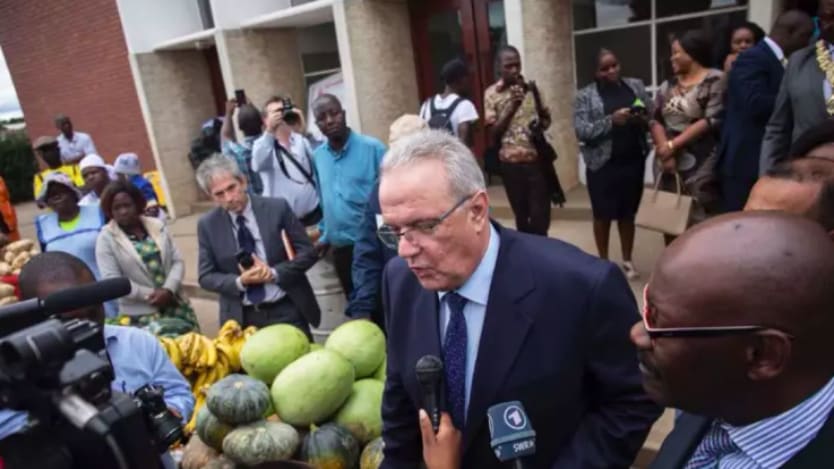
HARARE, Zimbabwe — The end of Robert Mugabe’s 37-year reign is a once-in-a-lifetime opportunity for the international community to engage with Zimbabwe, European Development Commissioner Neven Mimica said during an official visit to the country on Monday, outlining the reforms Brussels wants to see before increasing its support.
The commissioner said a successful democratic election this summer, and moves to clear billions of dollars worth of debt with institutions, including the World Bank and the European Investment Bank, are among measures he sees as key. He added that the EU would look at “upscaling our development cooperation envelope” if conditions are met.
Mimica’s one-day visit, the first by a European Union commissioner since 2009, included a meeting with President Emmerson Mnangagwa, who took power last November with military backing. Mnangagwa, the former vice president of Mugabe’s ruling Zanu-PF party, quickly announced a reform agenda aimed at attracting foreign investors to a country in economic strife, where 93 percent of working-age people are in the informal sector.
Mnangagwa’s first 100 days have received mixed reviews. Locals in the capital report feeling freer to talk politics since 94-year-old Mugabe was ousted, but there are concerns over possible repeats of electoral violence and fraud when the country goes to the polls in July.
Mimica said ensuring the vote is free, fair, and transparent is a key starting point if the transition is to be credible, legitimate, and well accepted by the people. Some 46 countries and 15 regional bodies, including the EU and its member states, have been approved as election observers, state media reported. The EU has already provided 11 million euros ($13.56 million) to help prepare the electoral process.
Observers also question whether Mnangagwa represents a true break with the past. The 75-year-old, nicknamed “the Crocodile,” has so far refused to apologize for the deaths of thousands of civilians from the Ndebele ethnic group at the hands of the army in the 1980s, while he was head of the security services. He cites his creation of a National Peace and Reconciliation Commission, telling The Economist last month: “Let’s wait for the results.”
Between 2002 and 2014 the EU sent all development aid to Zimbabwe through nongovernmental actors due to concerns over human rights and rule of law. Since then, it has resumed dialogue with the government on three priority areas — health, agriculture, and governance — although most money still goes through civil society. On Monday, Mimica launched three projects on health and youth support with 23 million euros ($28.35 million) from the EU.
At present, 234 million euros ($288.3 million) is being provided for the period 2014-2020, but the commissioner said Brussels will “look into upgrading, upscaling our development cooperation envelope until 2020, if all the processes of economic transition and transformation and political and democratic transformation [are] on the right track in the weeks and months to come.”
Asked by journalists invited to join the delegation which indicators the EU will use to decide whether to step up cooperation, Mimica said it was not a matter of “strict and formal benchmarks.” But he pointed to clearing the country’s debt, and “the conclusion of the land reform process,” as two “pre-conditions for setting the economic and investment environment that would be welcomed by the investors.”
The challenges facing the new administration include how to compensate white farmers stripped of their land in the early 2000s under Mugabe, and firming up land tenure rights.
EU Ambassador to Zimbabwe Philippe Van Damme told reporters on Sunday that the bankrupt Zimbabwean government has no choice but to re-engage with multilateral institutions in order to access international capital markets.
To do this, Van Damme said the government must clear arrears of at least $2 billion with the World Bank, African Development Bank, and the European Investment Bank; agree on a reform package with the International Monetary Fund — already underway through the Lima process, which started last year; and renegotiate its bilateral debt with countries, including Germany, France, and the U.K.
“That sequence they can’t escape,” the ambassador said, adding that development assistance is “the oil in the engine, but it’s not the engine. The engine of sustainable growth is investment — domestic or foreign direct investment. So we can help create that environment conducive for investment, but we are not the investors.”
Europe is one of many players seeking to turn over a new leaf with the southern African nation. Two members of the U.S. Senate Foreign Relations Committee were in Harare last weekend to discuss how free and fair elections could help end U.S. sanctions in place since 2001.
Mnangagwa has traveled extensively since taking office, drawing criticism for 13 trips in five months, including a state visit to China last week with an entourage of 90 people. The president’s spokesperson said the word “success” was an understatement for the Beijing trip as it achieved “an upgrading of economic relations to pave way for capital and investment, loans and grants by way of support.”
Chinese and Western interests are aligned in Zimbabwe in that both are seeking a reliable investment climate, Van Damme said. “That’s linked to security of tenure, property rights, debt management, stability and so forth, so they have the same concerns.”
Editor's note: The reporter traveled to Zimbabwe with the support of the European Commission. Devex retains full editorial independence and responsibility for this content.








